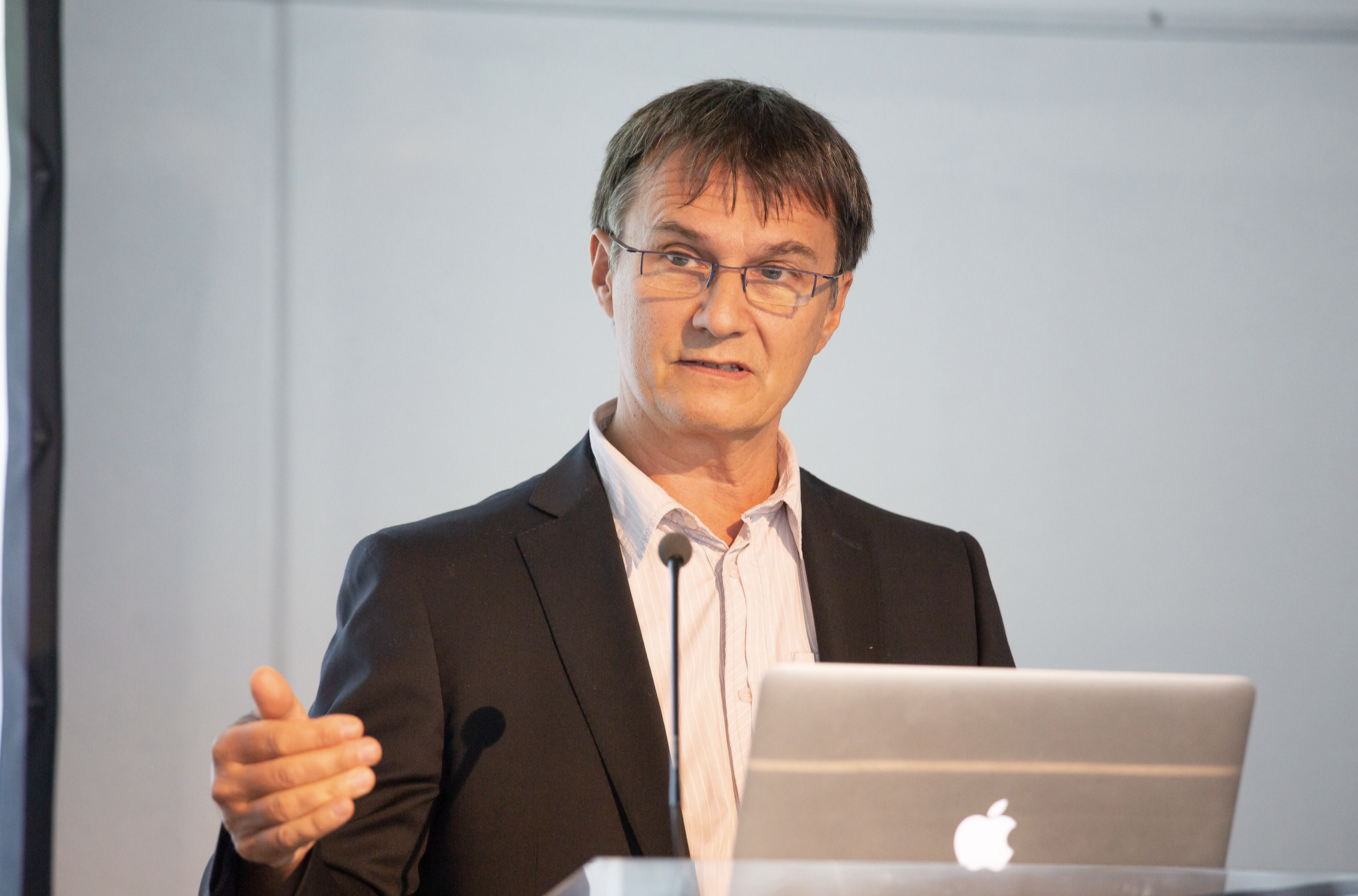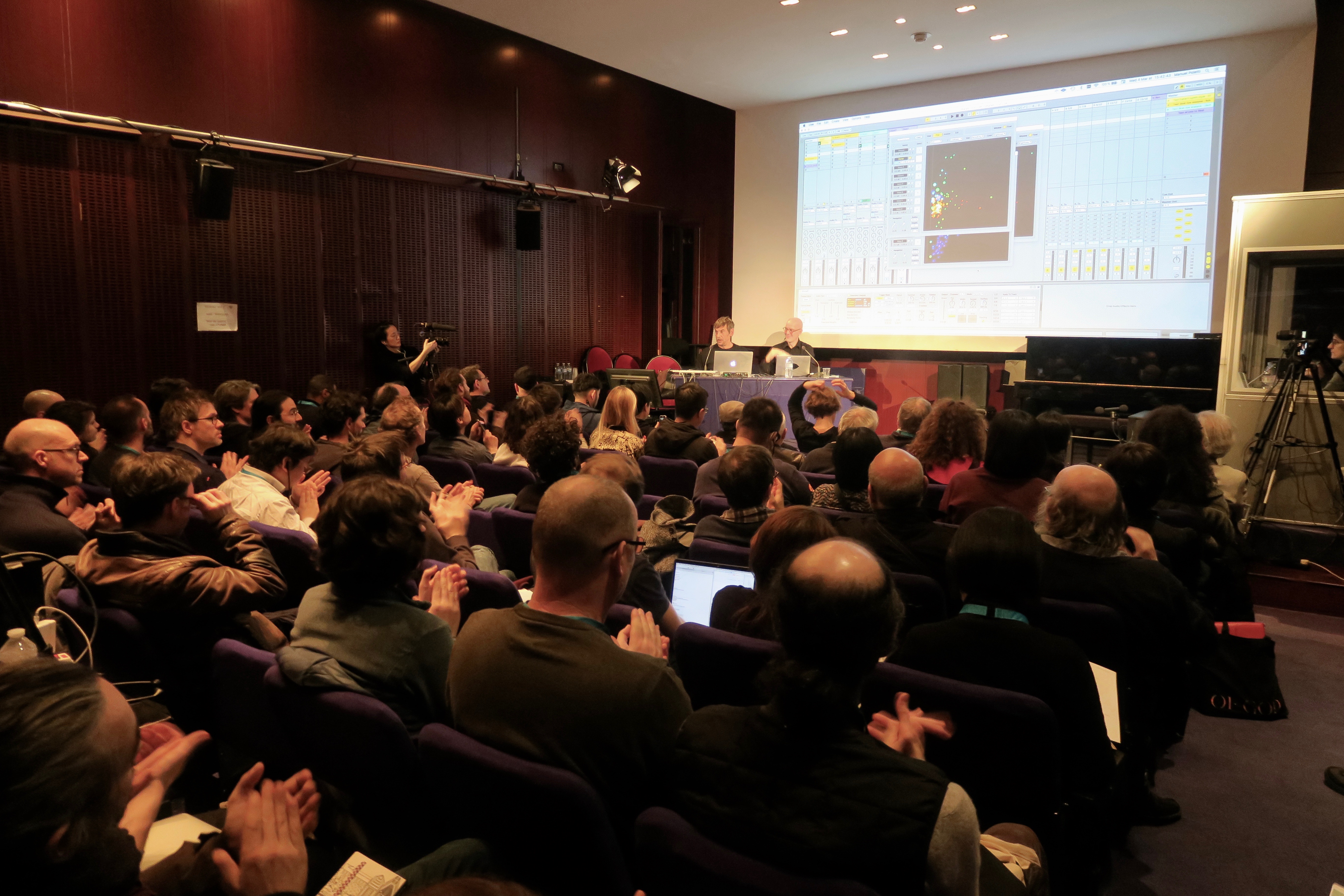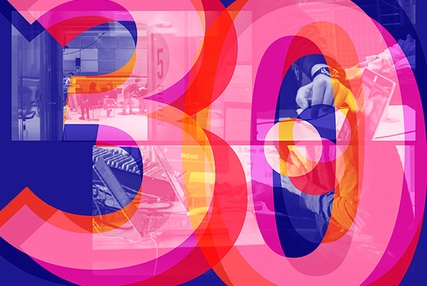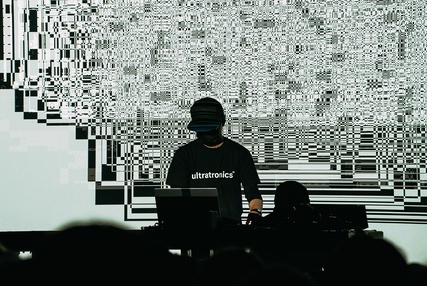À travers la plateforme web du Forum, l’Ircam s’engage auprès des créateurs sonores de tous horizons en leur donnant accès aux technologies les plus récentes issues de son laboratoire de recherche et en leur permettant d’y diffuser leurs propres travaux. Cette communauté des utilisateurs des logiciels de l’Ircam fêtera ses 30 années d’existence lors des prochains Ateliers du Forum, qui mettront l’Ircam en effervescence du 19 au 22 mars 2024.
Pour l’occasion, nous rencontrons Hugues Vinet, directeur de l’Innovation et des Moyens de la Recherche de l’Ircam, qui est le principal instigateur de l’événement.
 Hugues Vinet © Gregor Tatschl
Hugues Vinet © Gregor Tatschl
Hugues Vinet, dans quel état d’esprit avez-vous conçu cette édition spéciale des Ateliers du Forum ? Et quels en seront les temps forts ?
Chaque édition annuelle des Ateliers est déjà en soi un événement, avec les présentations des dernières nouveautés des équipes de recherche, une sélection de celles des membres, la présence de personnalités invitées et de sociétés partenaires. Mais nous avons souhaité marquer ce trentenaire par plusieurs propositions supplémentaires d’exception. L’Espace de projection sera investi à la fois par une programmation artistique réunissant Ryoji Ikeda, Ash Fure et le duo Lise Barkas & Yann Leguay et par des démonstrations de tout nouveaux dispositifs : une diffusion spatiale par WFS haute résolution – une première en Europe – et plusieurs installations reposant sur de multiples objets producteurs de son à base de nanordinateurs, reliés en réseau par le nouveau système SoundWorks. Pour célébrer cet anniversaire, le Forum Ircam s’est aussi investi dans deux prix mettant en avant les travaux de sa communauté artistique. Nous nous sommes associés à la ville italienne de Pesaro, capitale européenne de la culture en 2024, pour l’organisation du prix ISAC récompensant les meilleures œuvres musicales au format multicanal HOA (Higher-Order Ambisonics), et nous avons aussi créé un prix Musique Générative sélectionnant les meilleures approches de génération musicale et sonore purement algorithmiques. Les lauréats des deux prix seront annoncés et leurs œuvres jouées le 22 mars. Les résultats de l’édition 2024 des prix Mixage Fou décernés aux ingénieurs du son seront également présentés à cette session.
La programmation de ces Ateliers de mars comprend de nombreuses autres propositions, comme la découverte du tiers lieu Césure en plein quartier latin, un duo Miller Puckette-David Zicarelli, un débat organisé par le Centre national de la musique sur les enjeux de l’audio 3D pour la filière musicale, la présentation de la nouvelle offre de traitements musicaux dans le cloud d’Ircam Amplify ou une RAVE Party – sélection de performances reposant sur le logiciel éponyme. RAVE est aussi au cœur du nouveau produit de la startup DataMind que nous avons soutenue pour son modèle économique innovant rétribuant les artistes pour leurs apports aux données d’apprentissage de ce moteur à base d’IA. C’est bien là l’esprit du Forum Ircam, rejoint aussi par le projet DAFNE+ : mettre les dernières avancées technologiques au service des créateurs.
 Plateforme DAFNE + / Logiciel RAVE
Plateforme DAFNE + / Logiciel RAVE
Vous présenterez d’ailleurs cette nouvelle plateforme DAFNE+, permettant la diffusion de contenus artistiques à base de blockchain et de NFT…
Effectivement, ce projet européen dans lequel nous sommes particulièrement investis développe une plateforme tirant parti de ces technologies de blockchain et NFT au service d’une diffusion plus équitable et adaptée aux pratiques de la création contemporaine. Il se démarque techniquement des places de marché existantes à base de NFT en permettant aux artistes de déclarer des œuvres multi-auteurs, à des formats sans limite de complexité dépassant les catégories de base – image, son ou vidéo – comme par exemple des enregistrements multicanaux ou des archives numériques contenant tous les éléments pour la production d’une pièce interactive. Il prend également en charge la gestion de versions successives d’une œuvre numérique.
De plus, il a l’ambition de mettre en place une DAO (Distributed Autonomous Organization) donnant la possibilité aux membres de prendre part à la gouvernance et de contribuer à l’établissement des modes d’organisation et de rétribution. Pour l’Ircam, DAFNE+ est l’occasion d’expérimenter une extension logique du Forum dans la lignée du web3, permettant les échanges de la communauté non seulement autour d’outils de création mais également des dispositifs techniques de production des œuvres. Plusieurs sessions lui seront consacrées en mars, dont un atelier encadrant les participants pour qu’ils puissent démarrer leurs premiers projets sur la plateforme.
Quelles sont les dernières nouveautés distribuées par le Forum ?
Il y a de nombreuses évolutions pour la plupart des logiciels qu’il serait trop fastidieux de présenter exhaustivement. Parmi les avancées remarquables de l’année passée, on peut citer :
- ASAP sortie récente du plug-in Stretch Life proposant un nouveau concept d’interface pour le time stretching ; première version d’un plug-in CIRCE (synthèse de chant multi-locuteurs par apprentissage profond) ; extensions des plug-ins Spectral surface (filtrage temps-fréquence) et Pitches Brew (transposition et gestion du vibrato).
- Partiels (visualisation et édition d’analyses de sons) : nombreuses extensions – chaînage des analyses, nouvelle interface graphique, etc.
- Spat 5 et Panoramix (spatialisation sonore) : nombreuses optimisations et nouvelles fonctions notamment pour le format HOA (Higher Order Ambisonics) avec en particulier un nouvel algorithme de transcodage HOA vers binaural.
- MuBu (gestion de données temporelles dans Max) : nouveaux algorithmes de répartition géométrique et modules d’apprentissage.
- SkataRT : nouveaux corpus sonores – cuisine et guitare électrique.
- ISiS (synthèse de voix chantée) : intégration de nouvelles voix apprises.
- RAVE (transfert de timbre et générativité) : intégration d’un modèle d’évolution temporelle et de contrôle. Nouveaux modèles entrainés : SOL, ISiS, MusicNet.
- TheSnail (visualisation des signaux sonores) : nouveaux algorithmes mesurant les écarts de phase entre partiels et modes de visualisation, implémentation embarquée sur des cartes Raspberry Pi.
- Somax2 (générativité interactive pour l’improvisation) : architecture modulaire, enregistrement de corpus en temps réel, gestion de plusieurs régions, etc.
- SoundWorks (processus temps réel distribués): annonce de la toute nouvelle version V4.
 Les Ateliers du forum 2022
Les Ateliers du forum 2022
Quel regard portez-vous sur les 30 années d’innovation dans le domaine de la création musicale que le Forum a soutenu ?
Cette question sera abordée à l’occasion d’une table-ronde qui réunira les responsables successifs du Forum depuis sa fondation. Ce qui se dégage pour moi est une multiplicité d’innovations dans le maintien d’une continuité.
Continuité car la plupart des environnements que nous avons lancés depuis plusieurs décennies sont toujours pertinents aujourd’hui : Spat, OpenMusic, Modalys, Audiosculpt/ASAP, CataRT etc. etc. D’autres générations d’outils porteurs de nouveaux paradigmes complémentaires les ont successivement rejoints : Mubu, Omax/Somax/DICY2, Antescofo, Orchids/Orchidea, Gesture follower/CoMo, SkataRT, ISiS, RAVE, SoundWorks, etc.
Si ces logiciels sont toujours largement utilisés, c’est d’une part qu’un important effort est mené en permanence pour assurer leur support et leur documentation, mais surtout que leurs concepts initiaux étaient suffisamment porteurs pour être durables et qu’ils ont intégré au fur à mesure les derniers résultats de la recherche pour toujours se situer à l’état de l’art des technologies musicales et sonores. Ils se distinguent aussi de la pléthore de produits commerciaux par une orientation tournée vers la création contemporaine, en proposant des fonctions plus avancées, parfois expérimentales, notamment en matière de gestion de la complexité.
Le pendant du maintien de cette continuité est la gestion des ruptures. Ce support à long terme passe à certains moments par une refonte radicale sur de nouvelles bases de code, comme cela a été le cas dans le passé pour le Spat, pour OpenMusic, ou à plusieurs reprises pour Audiosculpt qui renaît sous une nouvelle forme avec les plug-ins ASAP et l’application Partiels. C’est aussi le propre de l’Ircam que d’être aux avant-postes des ruptures technologiques pour en proposer de nouvelles déclinaisons créatives, et les 30 dernières années ont à cet égard été particulièrement riches : traitement audio temps réel sur les processeurs standard et sortie de Max/MSP, généralisation du web puis Web Audio, iOS et Android, Max4Live, processeurs embarqués et open hardware, apprentissage profond, blockchains, etc. Chacune de ces évolutions s’est traduite par un impact plus ou moins large sur les technologies du Forum.
Une autre tendance importante de cette évolution est l’extension des usages et de leurs communautés : s’ils étaient concentrés au début sur ceux de la musique contemporaine, ils se sont depuis diversifiés à tous les secteurs de la conception et de l’esthétique sonores, dans un processus toujours en cours : arts du spectacle, multimédia et arts visuels, design sonore, ingénierie sonore, prototypage industriel, autres genres musicaux, etc.
La communauté du Forum connaît depuis plusieurs années une forte croissance et rassemble aujourd’hui plus de 60 000 membres dans le monde. Pour finir, avez-vous un message particulier à leur adresser ?
Nous ne pouvons certes vous accueillir tous en même temps, mais venez au moins une fois aux Ateliers du Forum et particulièrement à cette édition anniversaire qui s’annonce exceptionnelle. Bénéficiez de tout le panel de l’offre Forum en y adhérant en tant que membre Premium.




